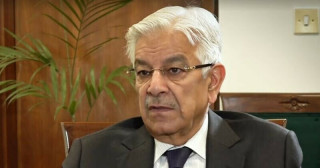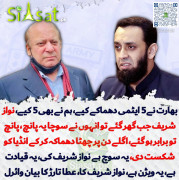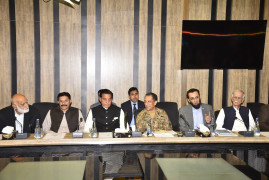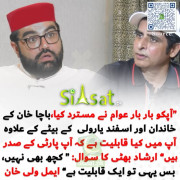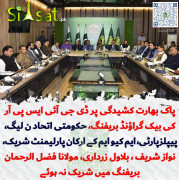hassanrazi
Politcal Worker (100+ posts)
Imran Khan's unwavering dedication to Pakistan's prosperity has garnered him steadfast support from his followers. The Pakistani establishment and government have shown reluctance to harm Khan, primarily due to his international status and influential global connections. If Khan were an ordinary citizen, both the establishment and his opposition would likely have silenced him. The prevailing system seems at odds with Khan's desire for transformative change, as the existing power structure, including influential mafia families and their cronies, obstructs his reformist ambitions. These families benefit from corruption, ensuring their continued prosperity.
Approximately 80% of media industries are under the control of these influential families. Media professionals, including journalists and anchors, are beholden to them, being controlled through bribery with housing plots, financial incentives, luxurious trips, and lavish gifts. Consequently, they are compelled to serve as puppets, promoting the agenda of these influential groups. Regrettably, individuals who champion truth and free speech often face state-sanctioned oppression, forcing them to seek refuge and protection.
A recent wave of journalist abductions by certain elements within the establishment has undermined press freedom and raised concerns about media workers' safety and security. Additionally, the brutal killing of a prominent investigative journalist on foreign soil raises serious questions about the potential involvement of intelligence agencies. The fear generated by these incidents has driven many senior journalists to flee the country in search of safety, as they continue to face ongoing death threats suspected to be associated with these agencies. These actions not only infringe upon journalists' rights but also threaten transparency and accountability, essential principles of democracy.
Equally concerning are reports of physical and sexual abuse targeting Imran Khan's supporters and journalists who hold dissenting views contrary to official government and establishment narratives. Such acts violate basic human rights and must be condemned unequivocally. Imran Khan's international celebrity status and influential connections provide a measure of protection, underscoring the importance of acknowledging this deterrent. Conversely, it is reasonable to speculate that an ordinary local leader lacking global connections would likely meet an unfortunate end, leaving no trace of their whereabouts.
The government comprises a select few influential mafia families that wield significant control and appoint loyalists to key positions. Recent concerns have emerged regarding the impartiality and competency of the individual appointed as army chief, following a retirement that coincided with a broader deal involving the former prime minister's ousting amidst the Panama scandal. This appointment has been perceived by some as appeasement to safeguard the interests of influential families and shield them from corruption charges by manipulating constitutional and legal frameworks.
The Pakistani establishment, led by the Chief of the Army, exercises substantial influence over the country's affairs, commanding a half-million-strong military force. Notably, Islam is often instrumentalized to gain support from the masses, with religious figures employed when popular backing wanes. The establishment operates a billion-dollar business empire, engaging in illicit activities such as the illegal occupation of state land, smuggling goods and drugs across borders, misappropriation of minerals, and extensive petrol theft. Concerns within the establishment arise from the potential threat to their lucrative business ventures should Khan curtail their authority, necessitating strict adherence to borders and legal limits.
In conclusion, Imran Khan's resilience within Pakistan's complex political landscape can be attributed to his global recognition and influential network. Nevertheless, he faces multifaceted obstacles posed by a power structure prioritizing personal gain over national welfare. It is crucial to stand firmly with Imran Khan and support him wholeheartedly, as losing him could lead to regression and the absence of a leader capable of confronting corruption and incompetence. Addressing our differences can come after the battle he fights on our behalf is won. Uniting in support of Khan is incumbent upon us all to counter the forces undermining his efforts. Together, we can strive for a better Pakistan by addressing the challenges at hand.
Approximately 80% of media industries are under the control of these influential families. Media professionals, including journalists and anchors, are beholden to them, being controlled through bribery with housing plots, financial incentives, luxurious trips, and lavish gifts. Consequently, they are compelled to serve as puppets, promoting the agenda of these influential groups. Regrettably, individuals who champion truth and free speech often face state-sanctioned oppression, forcing them to seek refuge and protection.
A recent wave of journalist abductions by certain elements within the establishment has undermined press freedom and raised concerns about media workers' safety and security. Additionally, the brutal killing of a prominent investigative journalist on foreign soil raises serious questions about the potential involvement of intelligence agencies. The fear generated by these incidents has driven many senior journalists to flee the country in search of safety, as they continue to face ongoing death threats suspected to be associated with these agencies. These actions not only infringe upon journalists' rights but also threaten transparency and accountability, essential principles of democracy.
Equally concerning are reports of physical and sexual abuse targeting Imran Khan's supporters and journalists who hold dissenting views contrary to official government and establishment narratives. Such acts violate basic human rights and must be condemned unequivocally. Imran Khan's international celebrity status and influential connections provide a measure of protection, underscoring the importance of acknowledging this deterrent. Conversely, it is reasonable to speculate that an ordinary local leader lacking global connections would likely meet an unfortunate end, leaving no trace of their whereabouts.
The government comprises a select few influential mafia families that wield significant control and appoint loyalists to key positions. Recent concerns have emerged regarding the impartiality and competency of the individual appointed as army chief, following a retirement that coincided with a broader deal involving the former prime minister's ousting amidst the Panama scandal. This appointment has been perceived by some as appeasement to safeguard the interests of influential families and shield them from corruption charges by manipulating constitutional and legal frameworks.
The Pakistani establishment, led by the Chief of the Army, exercises substantial influence over the country's affairs, commanding a half-million-strong military force. Notably, Islam is often instrumentalized to gain support from the masses, with religious figures employed when popular backing wanes. The establishment operates a billion-dollar business empire, engaging in illicit activities such as the illegal occupation of state land, smuggling goods and drugs across borders, misappropriation of minerals, and extensive petrol theft. Concerns within the establishment arise from the potential threat to their lucrative business ventures should Khan curtail their authority, necessitating strict adherence to borders and legal limits.
In conclusion, Imran Khan's resilience within Pakistan's complex political landscape can be attributed to his global recognition and influential network. Nevertheless, he faces multifaceted obstacles posed by a power structure prioritizing personal gain over national welfare. It is crucial to stand firmly with Imran Khan and support him wholeheartedly, as losing him could lead to regression and the absence of a leader capable of confronting corruption and incompetence. Addressing our differences can come after the battle he fights on our behalf is won. Uniting in support of Khan is incumbent upon us all to counter the forces undermining his efforts. Together, we can strive for a better Pakistan by addressing the challenges at hand.

